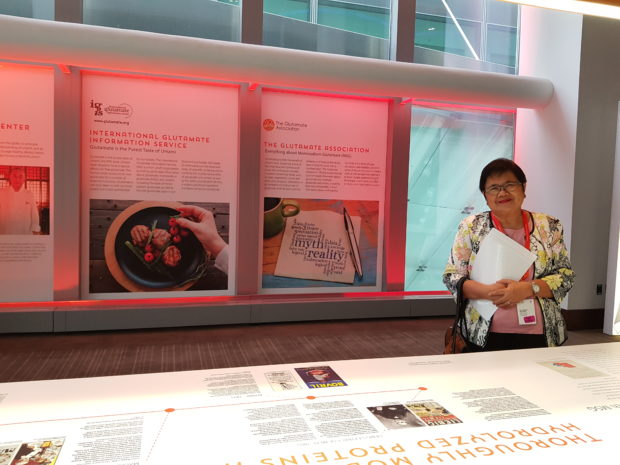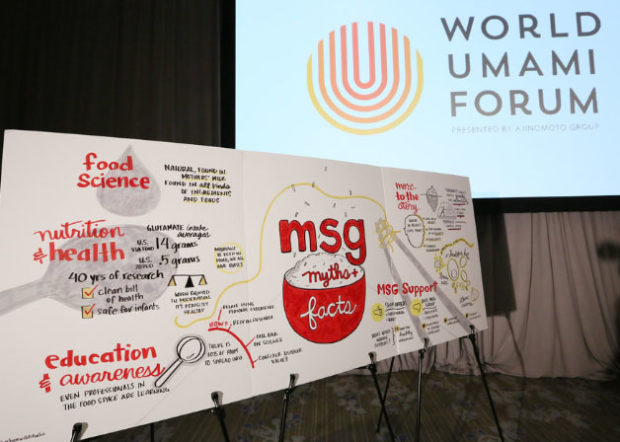World Umami Forum
As a nutritionist-dietician and food scientist, I welcome opportunities to clarify myths and fallacies surrounding food and nutrition because I believe that misconceptions can often lead to incorrect diet practices and pose serious health risks. One of the most common topics I encounter is the fear of using Monosodium Glutamate or MSG. Even though, many credible organizations and scientific studies affirmed MSG’s safety for decades, this seasoning ingredient continues to be the target of many false claims. I recently attended the World Umami Forum presented by the Ajinomoto Group at Manhattan, New York City. Umami, the fifth basic taste that we often hear from chefs nowadays, is likewise described as savory, mouth-watering, lingering sensation, delicate and subtle or a pleasant after taste with satisfaction. This taste was discovered alongside the invention of MSG in Japan. However, while umami gains popularity as the sought-after universal taste, the stigma in using MSG persists. The World Umami forum brings together food, nutrition and science experts to discuss and establish science-based facts about MSG, hoping the world will be rid of apprehensions in using this umami seasoning.
While facts presented about umami and MSG during the event was a review of my previous knowledge, I was fascinated to learn about the reason and psychology behind the MSG paranoia existing despite the overwhelming scientific evidences of its safety. A panel discussion cited the challenge of addressing the MSG controversy because for some, it is not solely a discussion about science but about an identity shaped by personal beliefs and experiences. When these beliefs are challenged, some people take it as a personal attack and would usually voice out negative opinions about the matter.
Historic Gastronomist Sarah Lohman traced back the MSG rumors in April 1968. This was when a physician by the name of Robert Ho Man Kwok suggested, without any study or proof, that the widely used MSG in Chinese restaurants is a possible cause for “numbness at the back of the neck, gradually radiating to both arms and the back, general weakness and palpitations”. A string of symptoms he coined as “Chinese Restaurant Syndrome”. This opinion letter by Dr. Kwok was later published at the New England Journal of Medicine and fueled rumors about MSG. The rumors stuck with people especially older generations, who were told in the 70’s and 80’s that MSG is bad. Even though, as explained by Ms. Lohman, “Chinese Restaurant Syndrome was thoroughly debunked by large-scale clinical trials at Harvard University, Northwestern University and the University of California.”
The truth is, less than 1% of the worldwide population has glutamate sensitivity. People with glutamate sensitivity are clinically tested to have short-term, adverse reaction not just to MSG but also other sources of glutamate like tomato, mushroom, cheese and other proteins. The rest of the world can freely enjoy MSG and other glutamate-rich food!
The World Umami Forum was a gastronomic showcase as famous chefs prepare umami food to the delight of the participants. Other than enhancing flavor of food, umami/MSG has benefits that cannot be simply ignored. Umami taste promotes satiety and intake of nutrients for children and elderly. MSG can help reduce sodium intake up to 30% which is a useful intervention to control high blood pressure. MSG and other glutamate-rich food promote protein digestion and absorption in the human body.
***
The author of this piece is Celeste C. Tanchoco, RND, MPH, DrPH, the country head of ILSI (International Life Science Institute) South East Asia Region Philippine Committee, Inc. She is a veteran in the field of nutrition having retired from the post of Chief Science Research Specialist for the Nutrition Science and Technology Division of the Food and Nutrition Research Institute (FNRI) of the Department of Science and Technology (DOST). Dr. Tanchoco is the former President of the Nutrition-Dietician’s Association of the Philippines (NDAP) and life member of the Philippine Association of Nutrition (PAN). She is also a board member of the Philippine Association for the Study of Overweight and Obesity (PASOO) and a member of the medical bureau of the Philippine Center for Diabetes Educators Foundation, Inc.
ADVT

